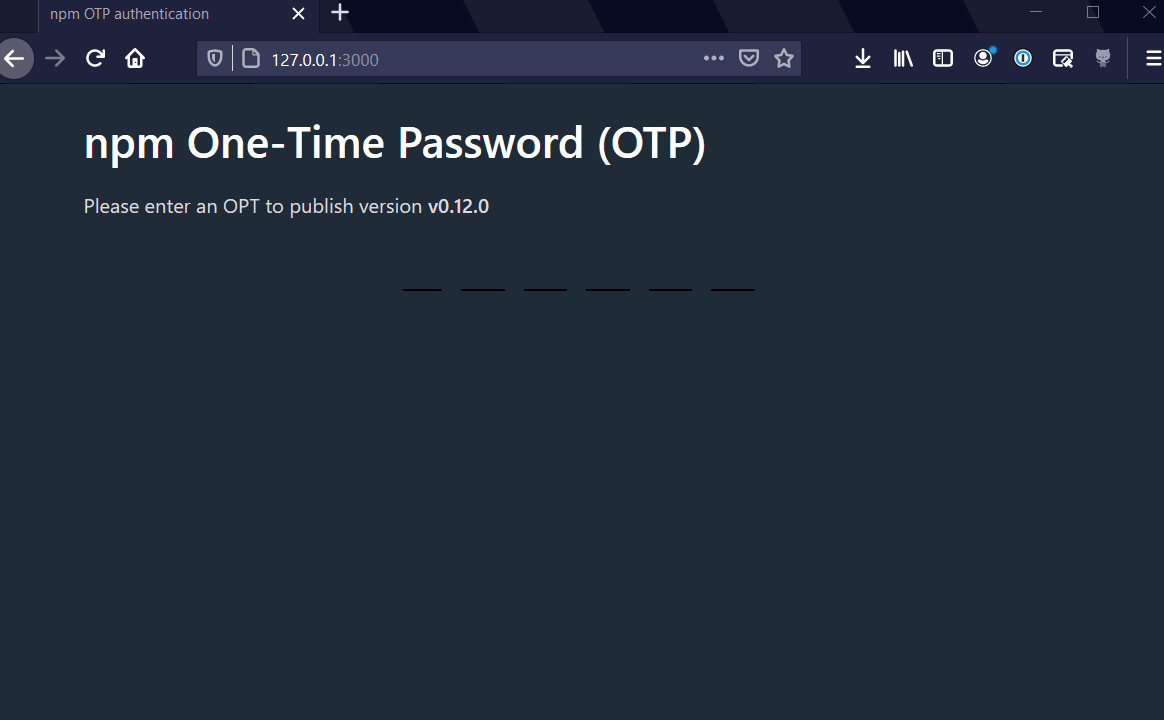@mmarchini/npm-otp-publish v0.16.0
NPM OTP Publisher
Action to publish npm pacakges that require 2FA by providing a way for users to provide One-Time Passwords.
This action is intended for users who require 2FA to publish their projects. If your project doesn't require 2FA, take a look at other npm publishing Actions in the marketplace.
Usage
on:
release:
types: [published]
name: releaser
jobs:
releaser:
runs-on: ubuntu-latest
steps:
- uses: actions/checkout@v2
- uses: mmarchini-oss/npm-otp-publish@v0
with:
npm_token: ${{ secrets.NPM_TOKEN }}
github_token: ${{ secrets.GITHUB_TOKEN }}
github_actor: ${{ github.actor }}To create a npm token, follow this guide: how to generate npm token. For extra security, it's highly recommended that you create a bot account on NPM instead of adding a token from your own account (if you do, remember to enable 2FA in the bot account). You can then add it to repository Secrets.
Entering the OTP
Every time the Action runs, it will notify the user using the selected
notifier and will wait for user input before trying to publish. Here's an
example GitHub notification:

Once the user clicks the link provided in the issue, they'll be redirected to the page below to enter the One-Time Password.

Usage with release-please
If you're using release-please or another Acton to auto-generate releases and
changelogs, running npm-otp-publish Action on release event won't work
because GitHub won't trigger events generated by another Action. To workaround
this issue, use npm-otp-publish on the same job as release-please:
on:
push:
branches:
- main
name: releaser
jobs:
releaser:
runs-on: ubuntu-latest
steps:
- uses: GoogleCloudPlatform/release-please-action@v1.6.3
id: release
with:
token: ${{ secrets.GITHUB_TOKEN }}
release-type: node
package-name: '<your package name>'
- uses: actions/checkout@v2
if: ${{ steps.release.outputs.release_created }}
- uses: mmarchini-oss/npm-otp-publish@v0
if: ${{ steps.release.outputs.release_created }}
with:
npm_token: ${{ secrets.NPM_TOKEN }}
github_token: ${{ secrets.GITHUB_TOKEN }}
version_url: https://github.com/${{ github.repository }}/releases/tag/${{ steps.release.outputs.tag_name }}
github_actor: ${{ github.actor }}Input
| Input | Required | Default | Description |
|---|---|---|---|
| npm_token | yes | npm token used to publish | |
| npm_user | no | npm user name (used on messages) | |
| version_url | no | URL to the release on GitHub | |
| notifier | no | github-issue | notifier to be used. Options are console, github-issue |
| timeout | no | 15 | timeout (in minutes) before the Action forcefully stops |
| github_token | no | github token (required if notifier is github-issue) | |
| github_actor | no | user who triggered the action | |
| github_release_team | no | release team to assign the issue |
How it works
npm 2FA requires users to provide a One-Time Password while publishing. Since these passwords are not known ahead of time, users need to look at an authenticator app to get the password every time they publish a package.
When publishing with Actions that's not normally possible though, since the Action will run entirely without user interaction. So for npm 2FA to work on Actions, we need to provide a way for the user to interact with a running Action and provide the One-Time Password.
To acomplish that, we start a web server in the Action and use ngrok to create a public-facing URL that users can access. There the user will find a form to input the One-Time Password found in the authenticator app. Once the user enters the OTP, it will be sent to the Action, which will try to publish the package using that OTP. If it succeeds, the Action will stop, otherwise it will keep running until either the user provides a valid OTP, or the timeout expires.
5 years ago
5 years ago
5 years ago
5 years ago
5 years ago
5 years ago
5 years ago
5 years ago
5 years ago
5 years ago
5 years ago
5 years ago
5 years ago
5 years ago
5 years ago
5 years ago
5 years ago
5 years ago
5 years ago
5 years ago